
Duck Amuck is an American animated surreal comedy short film directed by Chuck Jones and written by Michael Maltese. The short was released on January 17, 1953, as part of the Merrie Melodies series, and stars Daffy Duck.

Merrie Melodies is an American animated comedy short film series distributed by Warner Bros. Pictures. It is the partner series to Looney Tunes and featured many of the same characters. It originally ran from August 2, 1931, to September 20, 1969, during the golden age of American animation, though it was revived in 1979, with new shorts sporadically released until June 13, 1997. Originally, Merrie Melodies placed emphasis on one-shot color films in comparison to the black-and-white Looney Tunes films. After Bugs Bunny became the breakout character of Merrie Melodies and Looney Tunes transitioned to color production in the early 1940s, the two series gradually lost their distinctions and shorts were assigned to each series randomly.
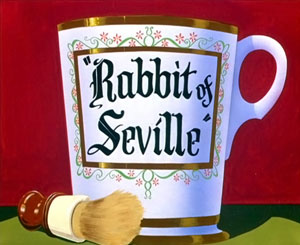
Rabbit of Seville is a Warner Bros. Looney Tunes theatrical cartoon short released on December 16, 1950. It was directed by Chuck Jones and written by Michael Maltese, and features Bugs Bunny and Elmer Fudd. The nonstop slapstick humor in the short is paced musically around the overture to Italian composer Gioachino Rossini's 1816 opera buffa The Barber of Seville. In 1994, Rabbit of Seville ranked number 12 in a list of "The 50 Greatest Cartoons" released in North America during the 20th century, a ranking compiled from votes cast by 1,000 artists, producers, directors, voice actors, and other professionals in the field of animation.
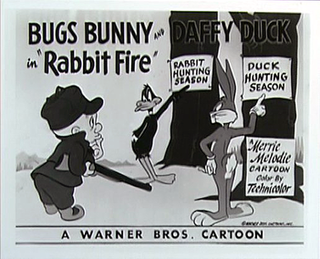
Rabbit Fire is a 1951 Looney Tunes cartoon starring Bugs Bunny, Daffy Duck, and Elmer Fudd. Directed by Chuck Jones and written by Michael Maltese, the cartoon is the first in Jones' "hunting trilogy"—the other two cartoons following it being Rabbit Seasoning and Duck! Rabbit, Duck! It is also the first cartoon to feature a feud between Bugs and Daffy. Produced by Edward Selzer for Warner Bros. Cartoons, the short was released to theaters on May 19, 1951 by Warner Bros. Pictures and is often considered among Jones' best and most important films.

Elmer's Pet Rabbit is a 1941 Warner Bros. Merrie Melodies cartoon directed by Chuck Jones. The short was released on January 4, 1941, and features Elmer Fudd and Bugs Bunny.

Duck! Rabbit, Duck! is a 1953 Warner Bros. Merrie Melodies cartoon directed by Charles M. Jones. The cartoon was released on October 3, 1953 and stars Bugs Bunny, Daffy Duck and Elmer Fudd.

Looney Tunes Golden Collection: Volume 1 is a DVD box set that was released by Warner Home Video on October 28, 2003. The first release of the Looney Tunes Golden Collection DVD series, it contains 56 Looney Tunes and Merrie Melodies cartoons and numerous supplements. The set won the Classic Award at the Parents' Choice Awards.

The Scarlet Pumpernickel is a 1950 Warner Bros. Looney Tunes theatrical cartoon short, directed by Chuck Jones and written by Michael Maltese. The cartoon was released on March 4, 1950, and stars Daffy Duck along with a number of other prominent Looney Tunes characters. The title is a play on the 1905 novel The Scarlet Pimpernel.

A Corny Concerto is a 1943 Warner Bros. Merrie Melodies directed by Bob Clampett. The short was released on September 25, 1943, and stars Bugs Bunny, Porky Pig, Elmer Fudd and Daffy Duck.
Beanstalk Bunny is a 1955 Warner Bros. Merrie Melodies cartoon directed by Chuck Jones. The short was released on February 12, 1955, and stars Bugs Bunny, Daffy Duck and Elmer Fudd. The cartoon's story is derived from the fairy tale "Jack and the Beanstalk".

A Pest in the House is a Merrie Melodies animated short film released on August 2, 1947. It is directed by Chuck Jones and stars the characters of Daffy Duck and Elmer Fudd.
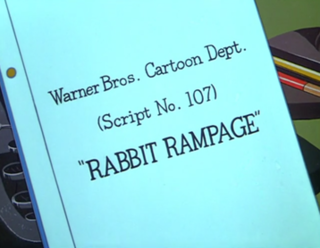
Rabbit Rampage is a 1955 Warner Bros. Looney Tunes animated cartoon, directed by Chuck Jones. The short was released on June 11, 1955, and stars Bugs Bunny.

Person to Bunny is a 1960 Merrie Melodies animated cartoon directed by Friz Freleng. The short was released on April 1, 1960, and stars Bugs Bunny, Daffy Duck and Elmer Fudd. It is the last cartoon to feature Arthur Q. Bryan as the voice of Elmer, and was released shortly after Bryan's death.

This Is a Life? is a 1955 Warner Bros. Merrie Melodies animated cartoon directed by Friz Freleng, written by Warren Foster, and produced by Edward Selzer, with music directed by Milt Franklyn. The short was released on July 9, 1955, and stars Bugs Bunny. The voices were performed by Mel Blanc, Arthur Q. Bryan, and June Foray in her first work for Warner Bros. This is one of the few Bugs Bunny cartoons whose title does not contain Bugs, bunny, rabbit/wabbit or hare.

Elmer J. Fudd is an animated cartoon character in the Warner Bros. Looney Tunes/Merrie Melodies series and the archenemy of Bugs Bunny. His aim is to hunt Bugs, but he usually ends up seriously injuring himself and other antagonizing characters. He speaks in an unusual way, replacing his Rs and Ls with Ws, so he often refers to Bugs Bunny as a "scwewy" or "wascawwy (rascally) wabbit". Elmer's signature catchphrase is, "Shhh. Be vewy vewy quiet, I'm hunting wabbits", as well as his trademark laughter.
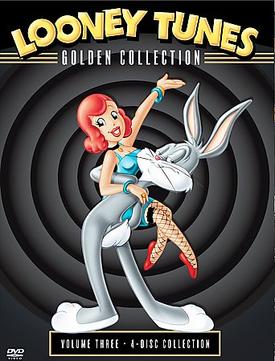
Looney Tunes Golden Collection: Volume 3 is a DVD box set from Warner Home Video that was released on October 25, 2005. It contains 60 Looney Tunes and Merrie Melodies theatrical short subject cartoons, nine documentaries, 32 commentary tracks from animators and historians, 11 "vintage treasures from the vault", and 11 music-only or music-and-sound-effects audio tracks.

Looney Tunes Platinum Collection: Volume 2 is a Blu-ray and DVD box set by Warner Home Video released on October 16, 2012. It contains 50 Looney Tunes and Merrie Melodies cartoons and numerous supplements. Disc 3 is exclusive to the Blu-ray version of the set. Unlike Volume 1, which was released in a digibook, Volume 2 was released in a standard 1 movie case. This release was followed by Looney Tunes Platinum Collection: Volume 3
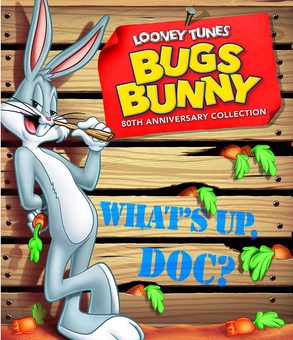
Looney Tunes: Bugs Bunny 80th Anniversary Collection is a Blu-ray Disc box-set released by Warner Bros. Home Entertainment on December 1, 2020. It contains 60 Looney Tunes and Merrie Melodies shorts starring Bugs Bunny and numerous bonus features and supplementary content. The set's packaging includes a slip book, a booklet, and a collectible Bugs Bunny Funko! POP doll.

















